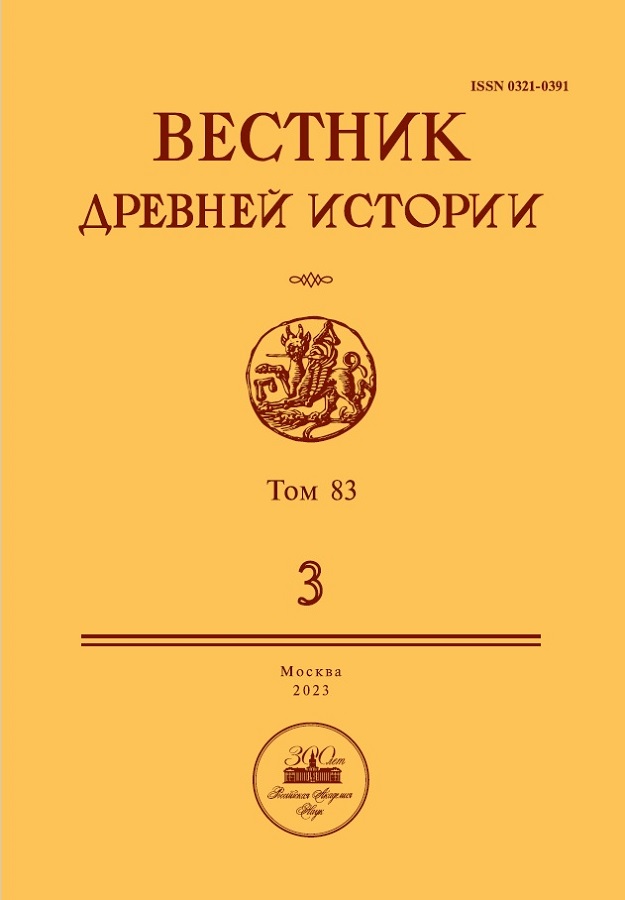Самопродажа ad actum gerendum в классическом римском праве
- Авторы: Дурново М.В.1
-
Учреждения:
- Московский государственный университет имени М.В. Ломоносова
- Выпуск: Том 83, № 3 (2023)
- Страницы: 593-605
- Раздел: Статьи
- URL: https://rjraap.com/0321-0391/article/view/648580
- DOI: https://doi.org/10.31857/S032103910023142-9
- ID: 648580
Цитировать
Полный текст
Аннотация
Ульпиан (10 ad Sab.: D. 28. 3. 6. 5) упоминает самопродажу ad actum gerendum (т.е. с целью ведения дел другого лица в качестве управляющего) наряду с самопродажей ad pretium participandum (т.е. с целью получения части цены) как causa servitutis, приводящую к утрате римлянином гражданских прав. По мнению автора, самопродажа ad actum gerendum, как и ad pretium participandum, представляла собой особую мошенническую схему, предпола-гавшую обогащение самопродавшегося за счет обманутого покупателя, с момен-та покупки – его мнимого господина (присвоение мнимым рабом денег, которые он нажил втайне от хозяина, управляя его имуществом), и положительный для мошенника исход процесса о свободе (causa liberalis). Защита обманутого поку-пателя посредством исков в данном случае оказывалась неэффективной, и по-этому, чтобы воспрепятствовать реализации преступной схемы и покарать зло-умышленника, мнимому господину как ответчику в causa liberalis стали предо-ставлять исковое возражение emptionis atque actus administrati, приводившее к denegatio proclamationis мнимого раба, лишавшей его возможности отстаивать свою свободу в ходе судебного разбирательства, и, таким образом, он становил-ся «рабом де-факто», который приравнивался к подлинному рабу.
Ключевые слова
Об авторах
Максим Владимирович Дурново
Московский государственный университет имени М.В. ЛомоносоваРоссийская Федерация, Москва
Список литературы
- Aubert, J.-J. 1994: Business Managers in Ancient Rome: A Social and Economic Study of Institores, 200 BC – AD 250. Leiden–New York–Köln.
- Buckland, W.W. 1908: The Roman Law of Slavery: The Condition of the Slave in Private Law from Augustus to Justinian. Cambridge.
- Carlsen, J. 1995: Vilici and Roman Estate Managers until AD 284. Rome.
- Coli, U. 1922: Saggi critici sulle fonti del diritto romano. I. Capitis deminutio. Firenze.
- Crook, J. 1967: Law and Life of Rome. Ithaca (NY).
- Duncan-Jones, R. 2016: Power and Privilege in Roman Society. Cambridge.
- Glancy, J. 2002: Slavery in Early Christianity. Oxford.
- Harris, W.V. 2011: Rome’s Imperial Economy: Twelve Essays. Oxford–New York.
- Herrmann-Otto, E. 1999: Causae liberales. Index 27, 141–159.
- Herrmann-Otto, E. 2002: Modes d’acquisition des esclaves dans l’Empire romain. Aspects juridiques et socio-économiques. In: M. Garrido-Hory (ed.), Routes et marchés d’esclaves: 26e colloque du GIREA, Besançon, 27–29 septembre 2001. Besançon, 113–126.
- Indra, M. 2011: Status quaestio: Studien zum Freiheitsprozess im klassischen römischen Recht. Berlin.
- Kaiser, W. 2001: Zur Herkunft des Codex Florentinus: Zugleich zur Florentiner Digestenhandschrift als Erkentnisquelle für die Redaktion der Digesten. In: A. Schmidt-Recla, E. Schumann, F. Theisen (Hrsg.), Sachsen im Spiegel des Rechts: ius commune propriumque. Köln–Weimar–Wien, 39–57.
- Kaser, M. 1996: Das römische Zivilprozessrecht. 2. Aufl. München.
- Lenski, N. 2012: Constantine and Slavery: Libertas and the Fusion of Roman and Christian Values. Atti dell’Accademia romanistica Costantiniana 18, 235–260.
- Mommsen, Th. (ed.) 1870: Digesta Iustiniani Augusti. Vol. 1. Berolini.
- Morabito, M. 1981: Les réalités de l’esclavage d’après le Digeste. Paris.
- Nicolau, M. 1933: Causa liberalis: Étude historique et comparative du procès de liberté dans les législations anciennes. Paris.
- Peppe, L. 2010: Fra corpo e patrimonio: Obligatus, addictus, ductus, persona in causa mancipi. In: A. Corbino, M. Humbert, G. Negri (a cura di), Homo, caput, persona: La costruzione giuridica dell’identità nell’esperienza romana. Pavia, 435–490.
- Ramin, J., Veyne, P. 1981: Droit romain et société: les hommes libres qui passent pour esclaves et l’esclavage volontaire. Historia. Zeitschrift für Alte Geschichte 30/4, 472–497.
- Reduzzi Merola, F. 2021: De quoi parle-t-on quand on parle d’esclavage volontaire à Rome? Dialogues d’histoire ancienne 47/1, 159–177.
- Reggi, R. 1958: Liber homo bona fide serviens. Milano.
- Silver, M. 2011: Contractual Slavery in the Roman Economy. Ancient History Bulletin 25, 73–132.
- Silver, M. 2016: At the Base of Rome’s ‘peculium’ Economy. Fundamina 22/1, 67–93.
- Söllner, A. (ed.) 2000: Corpus der römischen Rechtsquellen zur antiken Sklaverei. IX. Irrtümlich als Sklaven gehaltene freie Menschen und Sklaven in unsicheren Eigentumsverhältnisse: Homines liberi et servi alieni bona fide servientes. Stuttgart.
- Thébert, Y. 1993: The Slave. In: A. Giardina (ed.), L. Cochrane (transl.), The Romans. Chicago, 138–174.
- Wieling, H. (ed.) 1999: Corpus der römischen Rechtsquellen zur antiken Sklaverei. I. Die Begründung des Sklavenstatus nach ius gentium und ius civile. Stuttgart.
Дополнительные файлы











